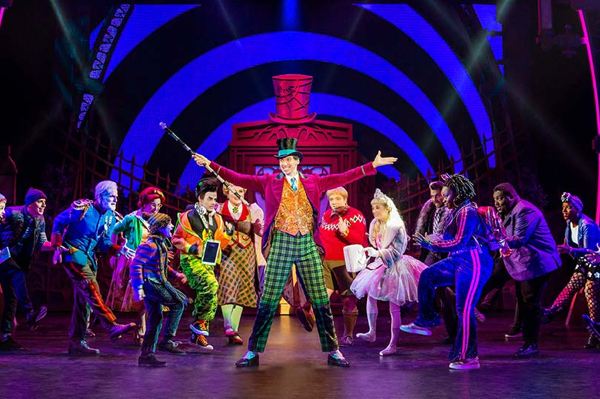
Semi-Sweet Chocolate and Oompa-Loompas at the Fox
By Laura Kyro
When I was recently at the limited engagement of the musical “Roald Dahl’s Charlie and the Chocolate Factory” at the Fabulous Fox Theatre (March 8-10), I saw a lot of kids and families in the audience. I would bet dollars to Scrumdidilyumptious bars that they were there because they already knew and loved the 1971 musical motion picture film “Willy Wonka & the Chocolate Factory” starring Gene Wilder and Jack Albertson (most likely). Or, they may have read the original 1964 book “Charlie and the Chocolate Factory” by author Roald Dahl (possible, but probably less likely). Either way, I fear that what they expected to see, and what they actually saw at the Fox was neither a live version of the film, nor even a faithful rendition of the book. Indeed, so many changes are introduced (as adapted by author David Greg, Director, Matt Lenz), I feel it veered rather unnecessarily far from either the film or the book. I don’t often tend to judge a theatrical production by its adherence to any source material I am aware of, but because most of the audience were probably there BECAUSE of familiarity with the source materials, the changes made were puzzling, confusing, and, to me, disappointing.
Either way you might have been introduced, the general story is that Willy Wonka (a powerfully-voiced Cody Garcia) welcomes five children and their guardians to visit his chocolate factory, run with the help of a miniature race of beings known as Oompa-Loompas. One child, Charlie Bucket (William Goldsman) is a down-on-his-luck boy deserving of something positive in his life. The disturbing natures of the other children and their guardians reveals that the story is actually a cautionary tale warning that behavioral excesses such as gluttony, narcissism, obsessions, and overindulging a child’s every whim, are a cause for meting out some form of punishment.
That’s the general story, but here, Willy Wonka, the eccentric, beguiling, slightly magical character the audience may have expected to see, is rude, uneven, conflicted, and actually does not so much just punish, but does away (if you catch my drift) with the wayward children. I don’t think this was called for (both the film and book have the children slightly worse for the wear, but alive), or is the message parents wanted their attending progeny to take away with them. A few other departures from cannon also had me thinking, "Why the change?" rather than just enjoying what I was seeing.
Judging the production for itself—without comparisons to any source materials— I believe it was still an uneven night. The set was technically golly-gee-wiz-amazing, but characters were overly broad (although rendered well by the actors). The songs (Marc Shaiman, Scott Whitman), except for “It Must Be Believed to Be Seen,” and those by Leslie Bricusse and Anthony Newley from the film (e.g., “Pure Imagination”), were un-memorable. The orchestra was so loud that lyrics for some songs could not be understood (I would swear some of the actors were singing-shouting as to just try to be heard). However, on the positive side, the Oompa-Loompas were nicely puppeted by the ensemble, actor Steve McCoy did right by the character Grandpa Joe, and Charlie’s mother, as portrayed by a clear-voiced Claire Leyden, helped much.
When all was said and sung, however, the applause was frequent and loud during the two-hour run time, and despite any personal disappointment on my part, it appears to have been a worthy night of semi-sweet theatre at the Fox.


